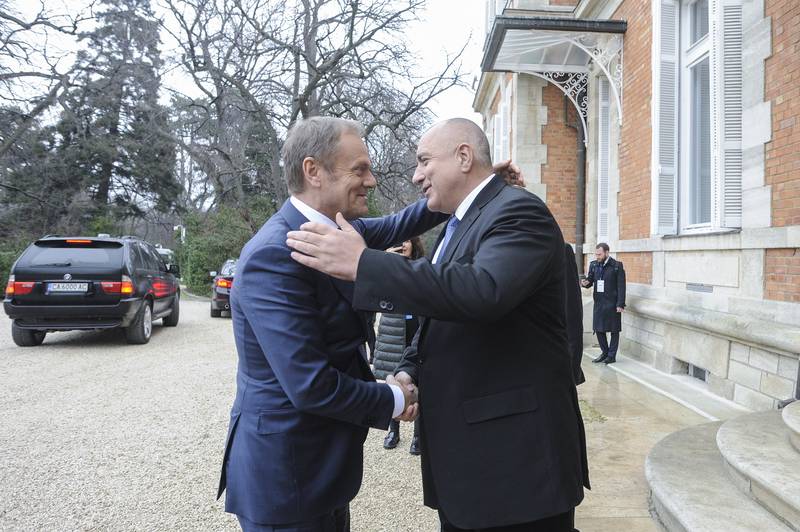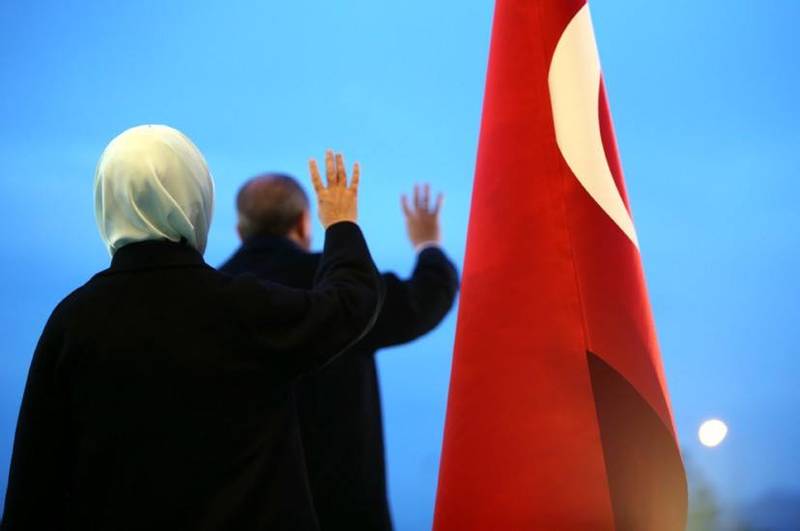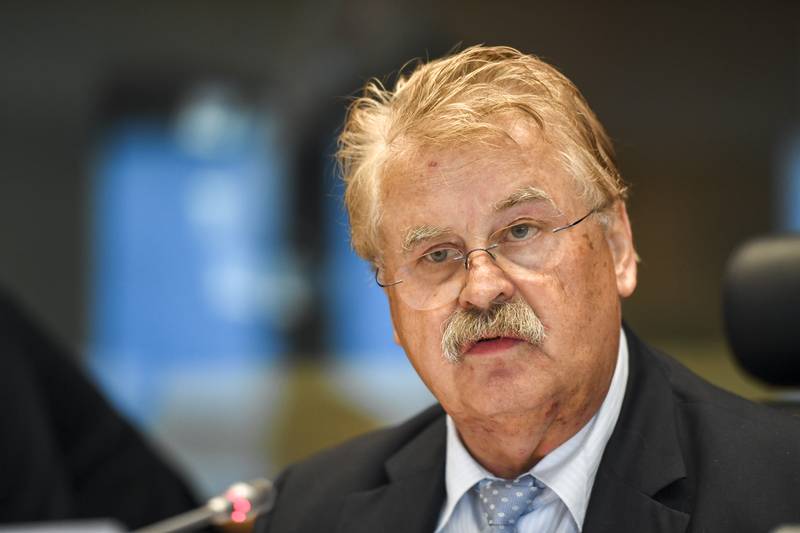Where Will Cyprus Be in 2025?
Adelina Marini, June 5, 2012
 The feeling of a deja vu is getting stronger by the day with the approaching of the June European Council when it is expected the EU leaders to take again crucial strategic decisions about the future of the Union. If you remember, last October, on the eve of the October European Council, amidst fears of a Greek default, rumours started to spread about a Europe of two or more speeds, about a eurozone break-up, about how much days it had left, etc. Then the summit to some extent responded to the expectations but in fact the big news for deeper integration came a bit later - in December with the decision for a new treaty (the fiscal compact). Now again it is being foretold how much life is left for the euro but the situation gets additionally complicated by the upcoming on July 1st Cypriot EU Presidency. So far, in the course of the crisis, on top of the Council of the EU were stable countries or at least such that would not add up to the already existing financial-economic troubles.
The feeling of a deja vu is getting stronger by the day with the approaching of the June European Council when it is expected the EU leaders to take again crucial strategic decisions about the future of the Union. If you remember, last October, on the eve of the October European Council, amidst fears of a Greek default, rumours started to spread about a Europe of two or more speeds, about a eurozone break-up, about how much days it had left, etc. Then the summit to some extent responded to the expectations but in fact the big news for deeper integration came a bit later - in December with the decision for a new treaty (the fiscal compact). Now again it is being foretold how much life is left for the euro but the situation gets additionally complicated by the upcoming on July 1st Cypriot EU Presidency. So far, in the course of the crisis, on top of the Council of the EU were stable countries or at least such that would not add up to the already existing financial-economic troubles.
In the climax of the crisis the Council was presided by countries like Spain (much before it became part of the problem) and Sweden, followed by the debuts of the Central European countries Hungary and Poland. At the moment, at the helm of the Union is Denmark, which can be perceived as fully neutral to the main problems because it has the privilege not to be a member of the euro area and to join whenever it deems appropriate. As of July 1st, though, the helm will be taken by Cyprus for the first time.
A fourth bailout?
The big question on the eve of the presidency debut of the divided island is whether Nicosia will be the fourth eurozone country to fall victim of the eurozone crisis and Greece in particular. As The Wall Street Journal writes, the chances of the country to resort to the euro area rescue fund are growing by the hour, as because of the situation in Greece the Cypriot government was forced to rescue its second largest bank. The yields on the Cypriot 10-year bongs is circling around 14%, debt is described by the rating agencies as "junk", the newspaper writes, which means that there is no investor that would agree to lend money to Cyprus under whatever conditions.
According to government forecasts the economy of Cyprus will grow by 0.8% this year but the International Monetary Fund sees things differently - a 1.2% recession. The Wall Street Journal recalls that last year the country negotiated a bilateral loan from Russia for 2.5 bn euros and at the moment is negotiating on a new bilateral loan with China the amount of which is still undisclosed. The government is reassuring it is doing everything in its powers to avoid asking for bailout from the rescue fund because it has undertaken measures and continues drawing plans to cut spending.
This is why, quite expectedly, the eurozone crisis was one of the main topics of the talks of European Council President Herman Van Rompuy in Nicosia last week. He, however, was cautious in selecting his words, given that, as he put it, Cyprus is about to get its baptism of fire as president of the Council at a time when the eurozone crisis is getting inflamed again. Right now the Union has no need of problems at its helm - the EU presidency. Mr Van Rompuy explained that Cyprus had all the assets to tackle the temporary difficulties: prosperous and cosmopolitan society and recently discovered energy resources (natural gas in the sea around the island). Moreover, Cyprus has  proved that it is capable of reforming itself - from an entirely agrarian state in the past now the country is an international financial centre.
proved that it is capable of reforming itself - from an entirely agrarian state in the past now the country is an international financial centre.
The main goal, he said before the Cypriot parliament, is the fiscal compact which Cyprus signed but has not yet ratified. In a combination to increasing revenues, reducing spending and structural reforms this would be a sufficient condition for facing the challenge. Without sounding like a mentor, making concrete recommendations but speaking more generally Herman Van Rompuy continued, saying that a sound economy needs high tax compliance, solid financial sector, flexible labour market and sustainable social protection system. "The choices how to achieve this are yours, but they have to be made", the European president warned and reminded that "stakes are high – for you as neighbours with close links to its [Greece] financial system, but also for all of us in the Eurozone".
It was back in October when the IMF warned the country that it had to follow very closely the developments in its banking sector because of the huge exposition of its banking system to Greece. The challenge for the Greek authorities is also deterioration of public finances.
The Cyprus Issue
A fourth bailout in the eurozone for a country that is presiding the EU might not prove such a significant problem, given that the presidency lasts only half a year. A much bigger problem could become adding new troubles to the European agenda, like for example redundant tension with Turkey. Ankara has already warned that it will refuse to work with the Cypriot EU Presidency unless a solution is found to the stalemate in which Turkey, Cyprus and the EU are in terms of the application of the Additional Protocol from Ankara for the customs union. The non-application of this protocol from Turkey's part is a reason the accession negotiations of the country to be frozen by Cyprus and several other member states. Ankara is refusing to undertake the first step, saying that the EU should first show readiness to continue the negotiations and not to use the Cyprus Issue to postpone finding a solution to the main question - does Turkey have a place as a full fledged member in the EU?
 Brussels's reaction was immediate and determined - no one should boycott any European institution, such as the presidency, because this is precisely a European institution, no matter who is heading it on a rotation principle. This position was reaffirmed by President Herman Van Rompuy, who said in Nicosia: "The Presidency is a fundamental institutional feature of our Union, based on the EU’s Treaty: it must be respected by all". Van Rompuy's speech before the Cypriot parliament, by the way, was a very clear message both for Turkey and Cyprus, the tone of which reminded paternal talking. Mr Van Rompuy said to the MPs that President Christofias showed him the window through which Archbishop Makarios escaped in 1974 an attack on the presidential palace, which was a crucial moment in the history of the country.
Brussels's reaction was immediate and determined - no one should boycott any European institution, such as the presidency, because this is precisely a European institution, no matter who is heading it on a rotation principle. This position was reaffirmed by President Herman Van Rompuy, who said in Nicosia: "The Presidency is a fundamental institutional feature of our Union, based on the EU’s Treaty: it must be respected by all". Van Rompuy's speech before the Cypriot parliament, by the way, was a very clear message both for Turkey and Cyprus, the tone of which reminded paternal talking. Mr Van Rompuy said to the MPs that President Christofias showed him the window through which Archbishop Makarios escaped in 1974 an attack on the presidential palace, which was a crucial moment in the history of the country.
Archbishop Makarios is the first president of independent Cyprus after the rejection of British colonialism. During the Greek coup and the Turkish occupation of the north part of the island in 1974 he flees from he country. "In the lives of nations, as in the lives of people, isolated moments, such as that escape, sometimes change a country's course. Like the moment when Lech Walesa in the Polish port of Gdansk, in the summer of 1980, decided to resist, turning a local strike into a fight for freedom. Or when the French minister Robert Schuman and the German chancellor Konrad Adenauer shook hands over Europe's founding treaty, in 1951, cementing the reconciliation between their nations", Van Rompuy said.
The upcoming Council presidency is important not only for the government and the administration, he continued, but is a moment for "all citizens of Cyprus – and I underline: for ALL citizens of this island – to feel more strongly their country is a member of the European club". He continued his speech in the same spirit, explaining that decades-old problems could not be solved miraculously but instead they depended on concrete actions. They do not happen, they are being done. "As a former Prime Minister of a country [Belgium] with its own complicated tensions between communities, I know what I am talking about! That is why I am calling on both sides to make every effort to pave the way towards a solution, towards a united Cyprus. [...] I know: overcoming the situation was difficult in 1974, it was difficult in 2000…, but if nothing changes it will still be difficult in 2025… Nobody should be a prisoner of the past. You can choose a different future", were the words of the president of the European Council.
Although these words were quite sufficient to prove the point and deliver the message, Herman Van Rompuy did not stop there but continued to talk to the MPs as if they were small children bickering over some toys. "The historic conciliation between France and Germany after many wars was built on the idea of sharing coal; coal and steel, the war-fuelling products stood at the basis of the European project. [...] I see a striking parallel. I am just asking a question as an outsider, but now that enormous gas reserves have been discovered in Cypriot waters, could this not be a welcome trigger to turn around the situation? Just like France and Germany 60 years ago came together  over coal, could in the case of Cyprus the avenue toward conciliation not be built on sharing and selling gas?"
over coal, could in the case of Cyprus the avenue toward conciliation not be built on sharing and selling gas?"
Herman Van Rompuy's words are indeed impressive and inspiring but still the comparison with France and Germany is unlikely to withstand the testing of the situation. France and Germany are similar in size and population, with comparable size of economy, who share common land. Cyprus is a dwarf against the backdrop of its huge northern neighbour Turkey. Moreover, the Greek part of the island has a non-confessed fault with Turkey as it rejected in 2004 at a referendum the plan for unification of the island, which had the aim of pushing Cyprus united into the EU. The Turks often resort to the result of that referendum when they explain their reluctance to apply entirely the Ankara Protocol.
Whether gas would turn into the "coal and steel" for solving the Cyprus Issue is hard to predict but it is clear that the Cypriot debut will bring additional noise into the already very tense European discourse. It is no accident that Herman Van Rompuy explained that preparation is not everything in EU presidency, because Cyprus is to face its baptism of fire. This means that Cyprus will have to show in the second semester of the year if it is capable of thinking about the European interest or only about its own. A test which proved for not a few new member states to be not their cup of tea. For Cyprus, though, it will have a twofold significance because it will affect the relations of the Union with a big and strategic partner - Turkey.
 Donald Tusk, Boyko Borissov | © Council of the EU
Donald Tusk, Boyko Borissov | © Council of the EU | © Turkey Presidency
| © Turkey Presidency Elmar Brok | © European Parliament
Elmar Brok | © European Parliament Klaus Regling | © Council of the EU
Klaus Regling | © Council of the EU Mario Centeno | © Council of the EU
Mario Centeno | © Council of the EU Mario Centeno | © Council of the EU
Mario Centeno | © Council of the EU